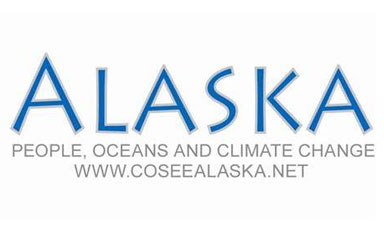COSEE Alaska began operations in 2008,
with a focus on climate change and coastal communities. Dr. Michael Castellini is now the Principal
Investigator (PI). As Dean of the University of Alaska Fairbanks (UAF)
School of Fisheries and Ocean Sciences (SFOS),
Mike is able to make connections between COSEE Alaska, scientists and students.
"Connections are a big deal here." |
"We began with looking at what typical scientists working in Alaska might need for broader
impacts and how COSEE Alaska could help," says Mike. "We also ask scientists what can we do – it's
meant to be a two-way street." COSEE Alaska projects provide places for interactions to happen.
SEANET |
Starting with the network of participants COSEE Alaska has built through its activities
SEANET has grown to an
informal online network of over 350 people, representing scientists, educators,
managers, the public. SEANET provides resources to scientists to help them develop
broader impacts, provides a way for educators to share information, and provides
connections between these communities.
|
|
|
|
Alaskan citizens are all concerned with the same topics – climate change, resource management,
sustainability – fueling the powerful urge to interact.
The
Alaska Marine Science Symposium,
of which COSEE Alaska is a co-sponsor, has become a main focal point for that interaction. Born in
the aftermath of the Exxon Valdez oil spill, the Symposium attracted 1100 participants last year.
COSEE Alaska uses the Symposium to highlight best practices for outreach. In 2007, as a way of
showcasing programs of outreach for scientists, COSEE Alaska held the first Communicating Ocean
Science (COS) workshop, which included case studies and training in social media. COS has been held
every year since then, on the first day of the Symposium, with an average of 100 people
participating. Mike Castellini has been part of the development of the COS workshop and is often
a presenter.
Native knowledge informs everything COSEE Alaska does. Western science doesn't "tell" coastal
communities what's going on around them – they already live it. COSEE Alaska focuses on
different ways of knowing climate change and bringing these together with mutual respect and
dialogue. This concept was built into the development of COSEE Alaska and is seen in the science
fairs, the work with schools, and the forging of links between climate change and its effect
on Native life and livelihoods.
Challenges to Mike's projects with COSEE Alaska include working with a small but dispersed and
very diverse population, along a coastline that's longer than all of the rest of the US
coastline put together. There is only one university system and one small private college
in Alaska, plus lots of agency scientists and scientists from outside the state who come to do
their research. While working with indigenous cultures is key, Mike also wants to make COSEE
Alaska's efforts relevant to people outside Alaska. "Alaskans are living day to day with a
changing climate" says Mike. Relevancy may not turn out to be a challenge after all.




